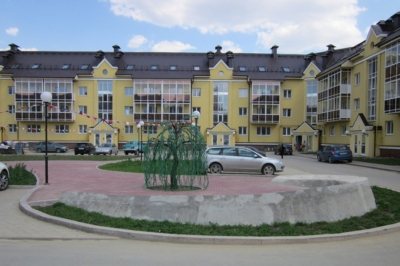What is a cooperative house? Advantages and disadvantages
The concept of a cooperative is familiar to everyone, especially those who lived through the Soviet era.
In the USSR, everything was common, there was no private property, but citizens also needed housing. To solve this problem, it was decided to build cooperative houses.
Few people know what this means – a cooperative house. This is a house that was built by a housing construction cooperative at the expense of the shares of members of the cooperative members. Upon completion of construction, each member of the association received their treasured square meters.
Such houses remain today; it is cheaper to buy an apartment in them. In cooperative houses, a special house management system and a special procedure for registering ownership of an apartment are established.
A cooperative member can document his rights to an apartment upon full payment of the share established by the agreement between him and the cooperative.
Possible risks and pitfalls
The most dangerous moment for any cooperative is bankruptcy. But for a member of the cooperative this does not always mean losses. Under any circumstances, the shareholder can buy out his apartment, but the debt must be repaid ahead of schedule before the interim liquidation balance sheet is approved. And if this option is excluded, then it is possible to purchase housing at auction. In the latter case, funds already deposited will be considered credited.
In any case, everyone who wants to become members of the cooperative should pay special attention to the reliability of the company with which they will cooperate.
If you find an error, please select a piece of text and press Ctrl+Enter.
Didn't find the answer to your question? Find out how to solve exactly your problem - call right now:
+7 (Moscow) +7 (St. Petersburg)
The term “cooperative” is familiar to many adult Russians who experienced Soviet rule. Previously, its interpretation and regulation by law was at the highest level, but today there are more and more questions regarding cooperative associations of residents. Despite this, interest in cooperatives is as stable as it has been for many years. Why? Everything is connected with the availability of this form of housing. In the article below we will highlight the cooperative house, the rights of its residents and the features of its existence in general. The information presented will be useful to both current and potential “cooperatives”, so you definitely shouldn’t ignore it.
Concept of a cooperative house
To best understand what a cooperative house is, you need to understand the definition of the word “cooperative.” Cooperative houses appeared back in Soviet times and proved themselves so successful that they still remain in our present.
A cooperative is a form of association of citizens. They can unite for various reasons and for various purposes. Hence the huge number of types of cooperatives existing in the country: garage, housing, industrial, consumer and others.
A housing construction cooperative is a form of association of people for the construction of a residential building and its further management. People contribute their money in the form of shares before the house is even ready. In essence, this agreement with a housing cooperative is similar to an equity participation agreement. However, it has more risks, since it is subject to registration only after the house is put into operation.
The simplified procedure for building a cooperative house is as follows:
- citizens unite, create a cooperative and form a common share;
- the house is being built by third parties;
- members of the cooperative move into finished housing and gradually pay off the remaining shares.
This procedure corresponds only to the activities of housing cooperatives. The housing cooperative does not build houses itself; it buys housing on the real estate market. Until the share is fully paid, the apartment remains the property of the cooperative.
Whether it should be privatized after full payment of the share is a personal matter for everyone. Privatization and full registration of ownership will allow you to freely sell your home in the future without the participation of other members of the cooperative.
Difference from an ordinary house
If you answer the question of how a cooperative house differs from an ordinary one, you need to highlight the key features of such housing.
The management of the cooperative house is carried out by the housing construction cooperative. In addition to the housing cooperative, the management of the house can be carried out by the HOA or the management company.
The difference here is manifested in the fact that the housing cooperative is formed even before the appearance of the house itself. An HOA is organized only when the house already exists. The management company is generally a separate division, not connected in any way with the house, except through a property management agreement.
Ordinary houses are built by developers or the state, sometimes at the expense of shareholders, sometimes at the expense of their own or borrowed funds. Cooperative houses are built by cooperative members, but not independently, but with the help of third parties.
Otherwise, the procedure for purchasing such an apartment or selling it, managing the house and resolving the most important issues is no different from the same events in an ordinary house. For example, payment for utilities is carried out according to the same scheme.
Do I need to pay for major repairs if the house is a cooperative one? It is necessary to pay contributions regardless of the type of house and the way it is managed. Minimum tariffs are set at the regional level. The accumulated funds are formed in special bank accounts opened by the housing cooperative or the regional operator.
You can refuse to pay contributions for major repairs only if the house is recognized as unsafe.
The rights of residents of a cooperative building are prescribed in the charter of the established cooperative and in agreements concluded between the participants and the association itself.
How to register in such housing? Just like in a regular house.
Advantages and disadvantages
A cooperative house and living in it has its pros and cons. The benefits are mainly related to the economic benefits of purchasing such housing.
The advantages of buying an apartment in a cooperative building are as follows:
- Citizens over 16 years of age or legal entities can become a member of the housing cooperative.
- To create a housing cooperative, a very small number of participants is enough.
- The overpayment for housing is minimal, since it only includes the costs of maintaining the housing cooperative during the construction of the house.
- The amount of the contribution is calculated on the basis of the construction estimate.
The minimum number of participants to create a housing construction cooperative is limited to 5 persons.
Here you do not need to collect a huge number of certificates and documents, as is the case when applying for a mortgage from banks. There is no such huge overpayment for an apartment as in the case of a house being built by a developer who wants to extract maximum profit from this project for himself.
The disadvantages of building a cooperative house include:
- The agreement is not registered, hence the high risks of double sales of apartments.
- A housing and savings cooperative may require additional contributions from members, the amount of which may significantly exceed the original shares of the participants.
- All additional and targeted contributions when a citizen leaves the cooperative are not returned to the housing cooperative.
Owners of future apartments will have to independently organize the construction process, purchase materials and monitor the work of builders. In a housing cooperative, it will be possible to move into a house only after repaying half of the full amount, and registering ownership only after the full repayment of the share. In total, housing cooperative participants have lower costs than housing cooperative participants.
It is better to choose a DDU for purchasing real estate that has not yet been built. Firstly, DDU is subject to mandatory state registration with Rosreestr to protect against the risk of double sales. Secondly, in 2019, escrow accounts are in force in the country, protecting the funds of shareholders from unscrupulous developers until the completion of construction of the house.
Apartment building management

Sochi 2014 Photo: iraukr
In fact, the Housing Code of the Russian Federation describes three methods of managing apartment buildings (https://www.consultant.ru/popular/housing/55_26.html), however, if you think carefully, then Section V of the Housing Code of the Russian Federation. Housing cooperatives can be considered as the fourth method of managing apartment buildings.
Those interested in choosing an alternative management method can study the fifth section of the RF Housing Code and use the cooperative method of managing apartment buildings. Good luck!
Housing Code of the Russian Federation in the latest edition
Section V. HOUSING AND HOUSING-CONSTRUCTION CO-OPERATIVES
Chapter 11. ORGANIZATION AND ACTIVITY OF HOUSING AND HOUSING-CONSTRUCTION CO-OPERATIVES
Article 110. Housing and housing construction cooperatives
The requirements of Part 1 of Article 110 of the Housing Code of the Russian Federation as amended by Federal Law No. 349-FZ of November 30, 2011 apply to housing cooperatives and housing construction cooperatives created after the date of entry into force of the said Law.
1. A housing or housing construction cooperative is recognized as a voluntary association of citizens and, in cases established by this Code and other federal laws, of legal entities on the basis of membership in order to meet the needs of citizens for housing, as well as the management of an apartment building.
(Part 1 as amended by Federal Law dated November 30, 2011 N 349-FZ)
(see text in the previous edition)
The provisions of parts 2 and 3 of Article 110 as amended by Federal Law No. 349-FZ of November 30, 2011, establishing that a housing cooperative and a housing construction cooperative act as a developer in accordance with the legislation on urban planning activities, apply to housing cooperatives and housing construction cooperatives cooperatives upon receipt of a construction permit after the date of entry into force of the specified Federal Law.
2. Members of a housing cooperative with their own funds participate in the acquisition, reconstruction and subsequent maintenance of an apartment building. When reconstructing an apartment building, a housing cooperative, in accordance with the legislation on urban planning, acts as a developer and ensures the reconstruction of this house on its land plot in accordance with the building permit issued to such a cooperative.
(Part 2 as amended by Federal Law dated November 30, 2011 N 349-FZ)
3. Members of a housing construction cooperative with their own funds participate in the construction, reconstruction and subsequent maintenance of an apartment building.
A housing construction cooperative, in accordance with the legislation on urban planning, acts as a developer and ensures the construction and reconstruction of an apartment building on its land plot in accordance with the building permit issued to such a cooperative.
(as amended by Federal Law dated November 30, 2011 N 349-FZ)
(see text in the previous edition)
4. Housing and housing-construction cooperatives (hereinafter also referred to as housing cooperatives) are consumer cooperatives.
5. The provisions of this chapter do not apply to other specialized consumer cooperatives created to meet the housing needs of citizens in accordance with federal laws on such cooperatives. The procedure for the creation and activities of such cooperatives, the legal status of their members are determined by the specified federal laws.
Article 111. Right to join housing cooperatives
The requirements of Part 1 of Article 111 of the Housing Code of the Russian Federation as amended by Federal Law No. 349-FZ of November 30, 2011 apply to housing cooperatives and housing construction cooperatives created after the date of entry into force of the said Law.
1. A member of a housing cooperative may be:
1) a citizen who has reached the age of sixteen;
2) a legal entity in the case established by the legislation of the Russian Federation;
3) a legal entity that is the owner of premises in an apartment building, if the housing cooperative manages the common property in this apartment building.
(Part 1 as amended by Federal Law dated November 30, 2011 N 349-FZ)
(see text in the previous edition)
2. The categories of citizens specified in Article 49 of this Code have a preferential right to join housing cooperatives organized with the assistance of state authorities of the Russian Federation, state authorities of constituent entities of the Russian Federation or local governments.
Article 112. Organization of a housing cooperative
1. The number of members of a housing cooperative cannot be less than five, but should not exceed the number of residential premises in an apartment building being built or acquired by the cooperative.
2. The decision to organize a housing cooperative is made by the meeting of founders.
3. Persons wishing to organize a housing cooperative have the right to participate in the meeting of the founders of a housing cooperative.
4. The decision of the meeting of founders on the organization of a housing cooperative and on the approval of its charter is considered adopted provided that persons wishing to join the housing cooperative (founders) voted for this decision.
5. Members of a housing cooperative from the moment of its state registration as a legal entity are persons who voted for the organization of a housing cooperative.
6. The decision of the meeting of the founders of the housing cooperative is documented in minutes.
Article 113. Charter of a housing cooperative
1. The charter of a housing cooperative must contain information about the name of the cooperative, its location, the subject and purpose of its activities, the procedure for becoming members of the cooperative, the procedure for leaving the cooperative and issuing a share contribution, other payments, the amount of entrance and share contributions, the composition and procedure for making entrance and share contributions, on liability for violation of obligations to make share contributions, on the composition and competence of the management bodies of the cooperative and bodies monitoring the activities of the cooperative, the procedure for their decision-making, including on issues on which decisions are made unanimously or by a qualified majority of votes, the procedure for covering losses incurred by members of the cooperative, the procedure for reorganization and liquidation of the cooperative.
1.1. The charter of a housing cooperative may provide for the use of a system or other information system when resolving issues related to management in a housing cooperative, taking into account the functions of these systems.
(Part 1.1 introduced by Federal Law dated July 21, 2014 N 263-FZ)
2. The charter of a housing cooperative may contain other provisions that do not contradict this Code and other federal laws.
Article 114. State registration of a housing cooperative
State registration of a housing cooperative is carried out in accordance with the legislation on state registration of legal entities.
Article 115. Management bodies of a housing cooperative The management bodies of a housing cooperative are:
1) general meeting of members of the housing cooperative;
2) a conference, if the number of participants in the general meeting of members of the housing cooperative is more than fifty and this is provided for by the charter of the housing cooperative;
3) the board of the housing cooperative and the chairman of the board of the housing cooperative.
Article 116. Management in a housing cooperative
1. The highest governing body of a housing cooperative is the general meeting of members of the cooperative (conference), which is convened in the manner established by the charter of the cooperative.
2. The competence of the general meeting of members of a housing cooperative (conference) is determined by the charter of the cooperative in accordance with this Code.
Article 116.1. Requirements for officials of a housing cooperative (introduced by Federal Law dated June 4, 2011 N 123-FZ)
Members of the board of a housing cooperative (including the chairman of the board of the cooperative), a member of the audit commission (auditor) of the cooperative, as well as the chief accountant (an accountant in the absence of a chief accountant on staff) of the cooperative cannot be citizens:
1) having a criminal record for intentional crimes;
2) in respect of whom the period during which they are considered subject to administrative punishment in the form of disqualification has not expired;
3) who previously held the positions of head, his deputy or chief accountant (an accountant in the absence of a chief accountant on staff) of an organization operating in the field of construction, reconstruction, major repairs of capital construction projects, engineering surveys for construction, architectural and construction design, or were individual entrepreneurs who carried out activities in these areas, if such organizations, individual entrepreneurs were excluded from members of self-regulatory organizations in the field of engineering surveys, architectural and construction design, construction, reconstruction, major repairs of capital construction projects or were declared insolvent (bankrupt) and from the moment of such exclusion or completion of the relevant procedure applied in the insolvency (bankruptcy) case, less than three years have passed.
Article 117. General meeting of members of a housing cooperative
1. The general meeting of members of a housing cooperative is valid if more than fifty percent of the members of the cooperative are present at it. The decision of the general meeting of members of a housing cooperative is considered adopted if more than half of the members of the housing cooperative present at such a general meeting vote for it, and on issues specified in the charter of the housing cooperative - more than three quarters of the members of the housing cooperative present at such general meeting .
2. The decision of the general meeting of members of a housing cooperative, adopted in the prescribed manner, is binding on all members of the housing cooperative.
3. The general meeting of members of the housing cooperative elects the management bodies of the housing cooperative and the bodies monitoring its activities.
4. The decision of the general meeting of members of the housing cooperative is documented in minutes.
5. In the case provided for in Part 1.1 of Article 113 of this Code, holding a general meeting of members of a housing cooperative using the system is carried out in compliance with the requirements established by Article 47.1 of this Code.
(Part 5 introduced by Federal Law dated July 21, 2014 N 263-FZ)
Article 118. Board of a housing cooperative
1. The board of a housing cooperative is elected from among the members of the housing cooperative by a general meeting of members of the housing cooperative (conference) in the number and for the period determined by the charter of the cooperative.
2. The procedure for the activities of the board of a housing cooperative and the procedure for making decisions by it are established by the charter and internal documents of the cooperative (regulations, regulations or other document of the cooperative).
3. The board of a housing cooperative manages the current activities of the cooperative, elects the chairman of the cooperative from among its members and exercises other powers not included in the competence of the general meeting of members of the cooperative by the charter of the cooperative.
4. The board of a housing cooperative is accountable to the general meeting of members of the cooperative (conference).
Article 119. Chairman of the board of a housing cooperative 1. The chairman of the board of a housing cooperative is elected by the board of the housing cooperative from among its members for a period determined by the charter of the housing cooperative.
2. Chairman of the board of a housing cooperative:
1) ensures the implementation of decisions of the board of the cooperative;
2) without a power of attorney, acts on behalf of the cooperative, including representing its interests and making transactions;
3) exercises other powers not assigned by this Code or the charter of the cooperative to the competence of the general meeting of members of the cooperative (conference) or the board of the cooperative.
3. The chairman of the board of a housing cooperative, when exercising rights and performing duties, must act in the interests of the cooperative in good faith and reasonably.
Article 120. Audit commission (auditor) of a housing cooperative
1. To exercise control over the financial and economic activities of a housing cooperative, the general meeting of members of the cooperative (conference) elects an audit commission (auditor) of the housing cooperative for a period of no more than three years. The number of members of the audit commission of a housing cooperative is determined by the charter of the cooperative. Members of the audit commission cannot simultaneously be members of the board of a housing cooperative, or hold other positions in the management bodies of a housing cooperative.
2. The audit commission of the housing cooperative elects the chairman of the audit commission from among its members.
3. Audit commission (auditor) of a housing cooperative:
1) without fail, conducts scheduled audits of the financial and economic activities of the housing cooperative at least once a year;
2) presents to the general meeting of members of the cooperative (conference) a conclusion on the budget of the housing cooperative, the annual report and the amount of mandatory payments and contributions;
3) reports to the general meeting of members of the cooperative (conference) on its activities.
4. The audit commission (auditor) of a housing cooperative at any time has the right to conduct an audit of the financial and economic activities of the cooperative and have access to all documentation relating to the activities of the cooperative.
5. The work procedure of the audit commission (auditor) of a housing cooperative is determined by the charter of the cooperative and other documents of the cooperative.
Article 121. Admission to membership in a housing cooperative
1. A citizen or legal entity wishing to become a member of a housing cooperative shall submit an application to the board of the housing cooperative for admission to membership in the housing cooperative.
2. An application for admission to membership in a housing cooperative must be considered within a month by the board of the housing cooperative and approved by a decision of the general meeting of members of the housing cooperative (conference). A citizen or legal entity is recognized as a member of a housing cooperative from the moment of payment of the entrance fee after the decision on admission to membership in the housing cooperative is approved by the general meeting of members of the cooperative (conference).
Article 122. Reorganization of a housing cooperative
By decision of the general meeting of its members (conference), a housing cooperative can be transformed into a homeowners' association.
Article 123. Liquidation of a housing cooperative
A housing cooperative may be liquidated on the grounds and in the manner provided for by civil law.
https://www.consultant.ru/popular/housing/55_19.html#p1593 © ConsultantPlus, 1992-2014
iraukr
Tweet
| Your email: * |
| Your name: * |
| Subscribers: |
Return to the main page of the site
Powers of the chairman and residents
Each cooperative has its own elected chairman and deputy chairman. They, as a rule, hold general meetings, put important issues on the agenda, and speak on behalf of housing cooperatives in other organizations.
It is necessary to clarify who these persons report to. In essence, they are subordinate to all members of the cooperative who cast their votes for their election. After all, appointment, as well as dismissal, is decided by everyone together at a general meeting.
The rights of the chairman of the housing cooperative can be characterized as follows:
- has the right to enter the premises of another owner in the event of an accident only with his consent;
- carries out personnel selection and management;
- in case of equality of votes among board members, has the right to a casting vote;
- has the right to vacate the position of chairman early;
- manages the funds of the cooperative;
- files lawsuits on behalf of the cooperative and represents its interests in various authorities;
- prepares and issues necessary documents to residents of the house.
The responsibilities of the chairman of a cooperative house are:
- conduct the activities of the cooperative in good faith and wisely;
- resolve issues related to the provision of utility services to homeowners;
- provide residents with recalculation of payments for poorly provided services;
- store documents of the cooperative and residents and provide them upon request;
- conduct banking operations, maintain accounting;
- exercise control over the improvement of buildings.
Every quarter, the chairman of the cooperative house is required to draw up a work plan and report on its implementation to the board at the end of each quarter.
Who maintains the cooperative house? The maintenance of the house is carried out by the housing cooperative, and not by the HOA or management company. It is for service that the chairman must constantly report to the residents.
Rights and obligations of the landlord
The landlord, no matter whether he is the owner of the apartment or an authorized person of the housing cooperative (chairman of the board), has the right to demand from the tenant timely payment for rental housing. In addition, he may demand compliance with living conditions. The responsibilities of the landlord include:
- transfer of vacant residential premises for rent to a tenant;
- if possible, participate in the repair and maintenance of the apartment;
- carrying out major repairs, especially if the housing does not meet technical or sanitary standards;
- control the provision of quality utility services to residents.
The landlord also has a certain responsibility for renting residential premises. Malicious failure to fulfill the obligations stipulated by the agreement and regulations may result in serious punishment for him. Most often this is compensation for various losses to residents and a reduction in rental fees.
Sale and purchase of an apartment in a cooperative building
How to sell an apartment in a cooperative building? To sell it, you first need to register ownership of it. In order to do this, you need to obtain a Certificate of payment of the share.
This document is the main one for registering property rights in Rosreestr. In essence, this is the title document for the apartment. Without it, it will be impossible to register the property or sell the home to another person.
This rule is true for both housing cooperatives and housing cooperatives. The only difference between them was that the housing cooperative built the house itself, and the housing cooperative acted as an intermediary in the purchase of apartments for cooperative members on the free real estate market. Until the full payment of the share, it was the cooperative that owned the housing.
Before purchasing a cooperative apartment, it is important to check the seller’s marital status during the period of payment of the share. If the spouses paid the share together and then divorced before the title was registered, the apartment will belong to both of them, even if the title is registered only in the name of one of them.
This should be given special attention before purchasing a cooperative apartment. There is one more nuance in such a deal. If the shareholder used maternity capital funds to pay the share, he will then be obliged to include his children among the homeowners. If he does not do this, all subsequent transactions with the apartment may be declared invalid and cancelled.
A cooperative house is a house built by a cooperative at the expense of its members. The cooperative not only builds such a house, but also manages it in the future through its chairman, elected by the members of the association at a general meeting.
A cooperative house has its advantages and disadvantages, which should be taken into account before purchasing such housing or before joining the ranks of members of the association.
Conditions for demolition of cooperative housing stock
At the end of today’s article, let’s pay attention to the possibility of demolishing the cooperative building. The conditions for such a measure are reflected in Articles 32, 86 and 134 of the Housing Code of the Russian Federation. If you wish, you can familiarize yourself with them without much difficulty. The interpretation and reflection of all legislative concepts are made accessible to Russian citizens.
When demolishing a cooperative building, several outcomes are possible:
- Residents will be provided with adequate state apartments with the possibility of subsequent privatization.
- Cooperative members will be paid compensation.
Note! If the shares are not fully repaid, the citizen receiving housing or compensation will be obliged to fully fulfill his obligations to the cooperative in the previously agreed upon manner.
Perhaps this is where the most important points on the topic of today’s article end. We hope that the presented material was useful to all readers and provided answers to their questions.
As you can see, there are no particular difficulties either in the phenomenon under consideration or in the rights of residents of a cooperative building. Everything is extremely simple and transparent to understand.
Cooperative home - pros and cons, what problems there are in the video:
See also Phone numbers for consultation March 28, 2021 kasjanenko 1261
Share this post
Discussion: there is 1 comment
- Ivan says:
10.26.2019 at 14:05I am now buying an apartment in a building that was previously considered a cooperative building. But the current owners have all the documents for ownership of this property. Could some unpleasant nuances arise later?
Answer
Housing and construction cooperative
| This article or section describes the situation in relation to only one region, possibly violating the rule of balanced presentation. You can help Wikipedia by adding information for other countries and regions. |
Housing construction cooperative (HBC) is an association of people or organizations for the purpose of housing construction, as well as for housing management. In the USSR, housing cooperatives were a form of citizen participation in the development of the housing stock, which made it possible to obtain a separate apartment faster within a separate queue and on more favorable terms.
The right to housing was guaranteed to citizens of the USSR by the Constitution and was ensured by “the development and protection of the state and public housing stock, promotion of cooperative and individual housing construction, fair distribution under public control of living space provided as the program for the construction of comfortable housing is implemented.”
Housing cooperatives in the USSR
Legislation
In the USSR, in order to attract funds from developers and develop housing construction, in July 1925, a decree “On Housing and Construction Cooperation” was adopted. It provided for the issuance of loans to housing construction cooperatives through the system of communal banks for a period of up to 60 years in amounts up to 90% of the estimated cost of the house. Since 1937, the construction of cooperative houses was allowed only at the expense of the cooperatives’ own funds and without the participation of bank loans, which actually meant the end of cooperative housing construction.
In the post-war period, the urban population increased sharply, and in order to solve the “housing issue” in 1958, the CPSU Central Committee and the Council of Ministers authorized the creation of housing construction cooperatives (HBCs). Thanks to the adoption of the resolutions of the Council of Ministers of the USSR “On individual and cooperative housing construction” (1962 and 1964), lending to housing cooperatives was resumed, to which Stroybank of the USSR provided loans in the amount of up to 60% of the estimated cost of construction for a period of 10-15 years at a rate of 0, 5% per annum and payment in equal installments. By a resolution of the Council of Ministers of the USSR in 1982, the amount of financing was increased to 70-80%, and the repayment period was increased to 25 years.
The construction of housing cooperatives was carried out by ordinary contractors, but the level of interior finishing in cooperative apartments was often higher.
The Housing Code of the USSR, in accordance with the amendments and additions introduced by the Decree of the Presidium of the Supreme Soviet of the USSR dated December 14, 1988, defined housing construction cooperatives as one of the forms of existence of the housing stock, along with state housing, public housing (this included housing on collective farms and other cooperative organizations , their associations, trade unions and other public organizations), as well as individual housing.
The law provided for the state’s obligation to provide housing and construction cooperatives with assistance in the operation and repair of the houses they own, to provide residents of cooperative apartments with other housing during the period of major repairs of their houses, and also to provide them with other equivalent housing free of charge if the housing cooperative’s house “is subject to demolition due to seizure land for state or public needs.”
Based on the housing legislation of the USSR, Housing Codes were in force in the Union republics.
Right to receive an apartment
To receive a cooperative apartment, the applicant had to be registered for improving housing conditions. But if to be on the waiting list for a state-owned, free apartment, a family member had to have less than 4.5 sq.m. living space, then for a cooperative apartment the conditions were softer: less than 6.5 m² per person. Only rooms were considered living space, excluding the kitchen and utility rooms.
The rules for providing living space were less stringent. When receiving a state apartment, a family member was provided with 9 m² (in the last years of the USSR, 12 sq.m.) and the rule was observed that children of different sexes should not live in the same room, that is, a family with two children of different sexes received a three-room apartment (45-70 sq.m. of living space), with children of the same sex - a two-room apartment (32-40 sq.m. of living space).
When purchasing a cooperative, the family could more freely choose their living space, justifying the need to have a more spacious apartment with additional rights: for example, candidates of sciences, members of creative unions (writers, composers, artists, journalists) by law had the right to 10 square meters. m of living space or a separate room in excess of the established standards.
Cost and financing
The cost of a cooperative apartment in Moscow in the mid-1980s was approximately 3,000 rubles (one-room) and 5,000 rubles (two-room), despite the fact that the average salary in the country in 1985 was 200 rubles per month. The loan to purchase an apartment was practically interest-free, and the share of the payment in the family’s expenses was insignificant. For a two-room cooperative, along with utilities, the family had to pay up to 50 rubles a month.
The bank loan for construction amounted to 70% of the cost, and in the Kazakh SSR, Siberia, the Far East, in the regions of the Far North and equivalent areas, as well as in mining villages - 80%. The bank interest on loans was 0.5% per annum, and on late payments - 3% per annum.
By Decree of the Council of Ministers of the USSR of August 19, 1982 No. 765 “On Housing and Construction Cooperation,” as amended on September 26, 1990, it was recommended that enterprises and organizations, with the consent of the workforce, provide free financial assistance to personnel workers (with at least 5 years of excellent work experience). years) and newlyweds (with at least 2 years of work experience) to pay for housing cooperatives from the material incentive fund, respectively, up to 30% and 40% of the first installment in the regions of Siberia, the Far East, the Far North and equivalent areas, as well as the Non-Black Earth Region, and in other areas, respectively, up to 15-20%.
At the beginning of 1985, loans for individual and cooperative construction accounted for approximately 55% of loan debt for the main types of consumer credit in the USSR.
Restrictions
Despite the presence of savings, citizens of the USSR could not freely buy a cooperative apartment, because in order to be placed on the waiting list they had to meet the standards stipulated by the Housing Code. After being placed on the waiting list, one also had to wait, although not as long as receiving a free state apartment.
There were actually cities closed for registration of non-residents (Moscow, Leningrad, the capitals of the union republics).
The share of housing cooperatives in the total volume of housing construction in the USSR did not exceed 10%
In the first half of the 1980s, in accordance with the principle of “an apartment for each family,” the construction of about 80 thousand cooperative apartment buildings was simultaneously started in many cities of the USSR. Most of these houses were completed only by the end of the 1990s. Thus, many citizens had to wait 15 years or more for construction to be completed.
Other forms of cooperation in housing construction
To speed up housing construction in the post-war USSR, the “people’s construction” method was used, when apartments were built for themselves by those in need of improved living conditions. Teams made up of such people went out on the second and third shifts after the main work to build houses, where the zero cycle had already been completed by the contractor (see the article Gorky method).
A variation of this method of housing construction in the 1980s were youth residential complexes that developed under the auspices of the Komsomol.
The difference between these forms of housing construction and housing cooperatives was that people invested not money, but personal labor, in improving their living conditions. All financing of the facilities was assumed by local governments.
Housing cooperatives in the Russian Federation
Currently, the term housing cooperative is defined in Article 110 of the Housing Code of the Russian Federation. The current legislation knows several forms of self-organization of citizens who want to improve their living conditions. As a general rule, it is assumed that they should join housing savings rather than housing construction cooperatives, since in relation to housing cooperatives there are stricter rules for controlling the flow of funds intended for construction. However, there are procedural rules regarding the creation and functioning of housing cooperatives in the Russian Federation and in our time. In Russia, many housing cooperatives have survived from the times of the USSR, and although when the new Housing Code of the Russian Federation was adopted (March 1, 2005), an attempt was made to oblige them all to transform into a Homeowners' Association, the corresponding amendment was canceled.
In most cases in modern Russia, housing cooperatives are the operating organization in relation to the housing stock. The creation of housing cooperatives for construction purposes was associated with numerous scams in the real estate market. Housing cooperatives as an organizational and legal form of association of citizens for construction are used by defrauded shareholders who want to complete the construction of their housing after the construction companies that attracted their funds stop construction. A similar scheme for solving the problem is used in Kazakhstan.
Notes
- 1 2 3 4 “Fundamentals of housing legislation of the USSR and union republics.” www.libussr.ru. Retrieved October 14, 2021.
- 1 2 3 Housing and construction cooperation (HCC) in the USSR. StudFiles. Retrieved October 14, 2021.
- 1 2 3 On housing and construction cooperation (as amended on September 26, 1990), Resolution of the USSR Council of Ministers of August 19, 1982 No. 765. docs.cntd.ru. Retrieved October 14, 2021.
- Housing Code of the RSFSR. Supreme Council of the RSFSR (June 24, 1983).
- 1 2 How much would Moscow apartments cost during the USSR in modern rubles. Elite real estate portal Elitnoe.ru. Retrieved October 14, 2021.
- Average monthly salary for calculating and increasing state pensions
- Cooperatives in a new way: what is a housing cooperative with state support. RBC Real Estate. Retrieved October 14, 2021.
- Legal regulation of the activities of housing construction cooperatives
- Defrauded shareholders created a housing cooperative
- To seize the property of unscrupulous developers in court, defrauded shareholders need to create a housing cooperative (inaccessible link)
> See also
- Condominium
- Building societies
- Housing savings cooperative
One apartment building can be managed by only one MA
According to the Housing Code of the Russian Federation, owners of premises in an apartment building are required to choose a method of managing apartment buildings:
- conclude an agreement with the management organization;
- create an owners' association or cooperative;
- manage independently if the building has no more than 30 apartments.
In this case, the house can be managed by only one management authority (Part 9, Article 161 of the RF Housing Code), chosen by the owners at a general meeting (Clause 4, Part 2, Article 44, Part 3, Article 161 of the RF Housing Code). Such a meeting will be legitimate and competent for decision-making if it was attended by owners with more than 50% of the votes of the total number of votes in the MKD (Part 3 of Article 45 of the Housing Code of the Russian Federation).
All this is clear and simple when it comes to an ordinary apartment building. But today developers often build houses consisting of different buildings. The buildings have the same addresses, differing only in the final numbering: city, street, house number, building 1, 2, 3…/A, B, C….
In such a situation, the owners of premises in the building may decide that they live in a separate apartment building, and therefore have the right to hold a general meeting of the building and, for example, create an HOA or choose a management organization different from the company that manages other apartment buildings. The legality of such actions depends on whether the building of an apartment building is an independent piece of real estate or part of a single apartment building.
On the reorganization of a multi-house HOA through the withdrawal of one apartment building from it
85670
To be or not to be cooperatives
In Soviet times, people united in cooperative organizations to build a house at their own expense. Thus, they immediately became the direct owners of the property. The owners could dispose of these apartments at their own discretion, but public housing could neither be sold nor exchanged.
The first housing cooperatives in the USSR began to appear in the 20s of the last century, but they did not last long - only 17 years. Then they were abolished. In 1958, the creation of cooperatives was again allowed, as thanks to this system it was possible to solve the problem of housing shortages. Despite the fact that the facilities had to be built at the expense of shareholders, the state made concessions and provided preferential loans to housing cooperatives. Sometimes future residents helped build the house themselves, coming to the construction site after work.
About forty years ago, a cooperative “one-room apartment” in Moscow cost about three thousand rubles, and a “two-room apartment” cost five thousand rubles. The average salary in the capital was no more than two hundred rubles. Despite the fact that in Soviet times almost every second citizen had savings, only a few could afford to buy real estate. The whole point is that first it was necessary to join the cooperative. Moscow residents had to wait for years until their turn came. At the same time, a strict selection was carried out. For example, nonresidents could not apply for inclusion in the list. Those who applied for cooperative housing were excluded from the queue for state apartments.
If at first cooperative houses were built relatively quickly and with very high quality, over time the pace of construction fell. Those who invested in such real estate in the mid-80s had to wait 10 years for the house to be completed.
“Today in our country there are several forms of self-organization of citizens who unite in order to improve their living conditions,” says Alexey Shmonov, general director of the real estate portal Move.su.
Some experts recommend joining housing cooperatives rather than building cooperatives. In the first case, as they say, there is more strict and serious control over the expenditure of funds intended for the construction of the facility. Others, on the contrary, believe that ZhNK is not the best and safest option.
There are still many housing cooperatives in our country - a kind of legacy of the USSR. At one time they tried to abolish them into HOAs, but property owners did not like this idea. As a result, the amendment made to the law was canceled.
In fact, housing cooperatives contain many risks. There will definitely be people who want to profit from this. On the other hand, if a construction company goes bankrupt, the defrauded shareholders can unite into a housing cooperative and independently complete the project at their own expense.
If we talk about a housing savings cooperative, then only citizens can be its members. At the same time, at least 50 people can come up with the initiative to create an association. All financial transactions are controlled by the Central Bank of the Russian Federation.
Is it worth doing?
To find out the answer to this question, it is necessary to examine all the features and pitfalls regarding joining membership, as well as the consequences of these actions.
Advantages of LCD and its various forms
There are the following types of housing cooperatives.
A peculiarity of housing cooperatives is that its members do not have the opportunity to register ownership of their property until their share is fully paid off.
ZhSK (housing construction)
The main document of such a cooperative is the charter, which prescribes the manipulation of joint property. Also within the organization there are such local bodies as the board, the chairman of the board and members of the audit commission.
In such a cooperative, general meetings of founders are often held, which initially must be at least five people. Housing construction is carried out through joint efforts by contributing shares to the common cause. Individuals and legal entities can join housing cooperatives.
The main advantage for a future member of the cooperative is the fact that almost immediately he is considered “one of our own”. Unlike a bank, numerous certificates and guarantees are not required here. A passport and a copy of the work book are the entire package of documents.

The advantages of housing cooperatives include the following facts:
- There is no need for authorized capital.
- The amount of the share contribution is calculated according to the estimate for building materials, construction work, etc.
- The overpayment for housing is minimal, since this includes ensuring the activities of housing cooperatives only during construction.
- There are no requirements for the minimum number of participants in housing cooperatives. This means that a project to develop a cottage house or several high-rise buildings can easily be organized by a very small group of people.
- Citizens who have reached the age of 16, as well as legal entities, have the right to join housing cooperatives.
ZhNK (housing savings)
This version of the cooperative allows members to accumulate the cost of housing by making share contributions. In this case, apartments are purchased within not one residential building, but several. Among the advantages of ZhNK:
- A one-time membership and share fee is required.
- There are no construction risks.
- The activities of the ZhNK are transparent to participants.
Disadvantages of different types of control
The procedure for citizens to join a housing savings cooperative, or ZhNK, and its functioning are regulated by the Housing Code of the Russian Federation and Law No. 215 “On Housing Savings Cooperatives” of December 30, 2004.
Let us outline the associated legal risks for members when joining such a cooperative:

- Double sales of apartments. The reason is the lack of state registration of contracts.
- If one of the founders has financial problems, then the remaining funds on the balance sheet will have to be contributed by other participants.
- Entry, membership, target, and additional fees are usually not returned when a citizen leaves the cooperative. The financial obligations of ZhNK are usually limited to the amount of funds contributed by the shareholders themselves, since ZhNK is not a commercial structure.
Common disadvantages of housing cooperatives:
- The owner will have to personally communicate with developers and architects, purchase building materials, hire builders, etc.
- Unfortunately, there is always the possibility of an organization going bankrupt.
- Privatization of housing is possible only after full payment of the entire amount.
Among the disadvantages of housing and communal services:
- Living in such an apartment is possible after paying at least half of the cost of housing, and becoming an owner is possible only after full payment of the entire amount.
- The final costs are significantly higher than those of members of the housing cooperative.
- In order not to fall into serious waste, you need to carefully study the organization’s charter and be aware of the financial statements of the selected cooperative over the past few years.
Cooperatives: pros and cons
Today a person can act as a tenant of an apartment or be its full owner. Once the full amount is paid, the cooperative ceases to exist as such. It is assumed that in the future a member of the cooperative will be the owner of the share and will be able to use the residential premises indefinitely. The share can be inherited.
Why is this necessary? According to some experts, in this case housing will become more affordable and those who cannot afford real estate at the average market price will be able to afford it. The share will cost less than the actual apartment in an apartment building.
Last September, changes to the law regarding housing cooperatives came into force. The amendments were necessary to simplify the work of housing construction cooperatives and ensure the financial security of their activities. Thanks to government support, shareholders will pay at least thirty percent cheaper, since they will be provided with land for free. Previously, there was a law according to which the site was transferred for development only after payment of 20% of contributions. Plus, there will be no developer margin and no costs that appeared during construction. Previously, for the same bank loan, developers were charged a serious interest, the amount of which was included in the cost of the property.
In addition, the state will make sure that fraudsters do not enjoy the trust of citizens and do not appropriate funds for themselves. All activities are carried out under the control of the cooperative and government authorities. Another big plus is that it is now prohibited by law to voluntarily liquidate a cooperative until the property is completely transferred to the rightful owners. Now citizens who decide to purchase a share in a cooperative house can do so using credit funds.
In the future, they plan to introduce a number of amendments to simplify the process of purchasing cooperative housing with state support. Today, shareholders are subject to a number of requirements. For example, one person can own only one share (i.e. can only claim one apartment).
Who is the owner of cooperative meters
Who is the owner of cooperative meters?
is the union itself. As noted above, the payer of shares has the right to allocate property exclusively to his own possession. The exception is those cases when the rules of the cooperative and concluded agreements between citizens imply a different procedure for owning cooperative property.
Most residents of cooperative houses do this:
- They buy housing on favorable terms on cooperative terms.
- Share obligations are fully extinguished.
- They allocate the resulting property into sole ownership and continue to live in it.
This approach is smart and safe, which is why it is implemented most often. From the point of view of any laws in absolutely all countries, living in a cooperative house solely on “cooperative law” is risky, especially with paid shares.
Definitely, at the first opportunity, you need to allocate the purchased home into sole ownership.
Key points in organizing a cooperative
To organize a housing construction cooperative, it is necessary to hold a meeting of the founders, at which, among other things, the charter of the organization is approved. It spells out all the main points, including the procedure for forming property, the size of shares and initial contributions, who and how can become a member of the cooperative, who and for what reason can be expelled from the organization, as well as the main points related to holding meetings and meetings. Particular attention should be paid to what powers are vested in the board members, chairman and other members, and, of course, what compensation will be received by those who want to leave the cooperative.
The first step is to submit an application to the housing mortgage lending agency, in which you should clearly state information about your intention to create a cooperative. The appeal indicates what type of development is planned, how many participants there will be, etc. After that, lists should be generated and an application for the provision of a site should be sent. After all the paperwork is completed, the cooperative is registered, all information is transferred to the housing mortgage lending agency, which must make a decision on transferring the land to the cooperative. After the facility is put into operation, the land is transferred to the ownership of the shareholders.
Thus, a cooperative house is already being built in the city of Grodno without attracting preferential loans. The average cost per square meter in a property is about 700 rubles.
The procedure for renting out housing in a housing cooperative building
Members of a housing cooperative have the right to rent out an apartment in which no one lives. Such apartments in a building often remain vacant when members leave the cooperative voluntarily or are expelled. The board can exercise this right until new members join the cooperative.
To rent out cooperative housing, an agreement must be drawn up.
In general, it is enough to draw up a sublease agreement. This is also indicated in the Housing Code. The agreement must be in writing. It also usually contains the data of the parties, information about the landlord’s family members living in the rented apartment, rental periods for residential premises, etc. If the period is not specified, then the agreement is valid for 1 year. At the end of this period it is terminated and the rental of residential premises becomes invalid.
HOA: basic concepts
If owners want to manage their own property, control costs, and carry out renovations, they can form a homeowners' association. This is a good alternative to various management companies, with which residents are usually dissatisfied. HOA members, for example, decide for themselves when repairs need to be carried out and with whom it is better to cooperate. In this case, all expenses and tariffs are discussed at a general meeting, expenses are completely transparent and understandable. If, for example, the house decides to rent out the basement, the money received can be spent on major repairs.
The housing and savings cooperative is practically unpopular, since the risk of falling for a fraudster is too great. Ideally, all actions of housing and communal services should be discussed and should not go beyond the law of the Russian Federation, however, in reality there may be a completely different picture. On the other hand, ZhNK can be considered an excellent alternative to a mortgage loan.
Related topics:
- How much does it cost to insure a house against fire Powerful protection for your home We offer two insurance programs. "Rosgosstrakh-dom "Active" "Rosgosstrakh-dom "Prestige" This...
- Deed of gift for a house Who can it be issued to? It is known that real estate re-registration procedures are not always suitable for a specific situation. IN…
- Documents for the house Mandatory land surveying from 2021 This is: Act on the provision of land Issued by local government bodies authorized…






